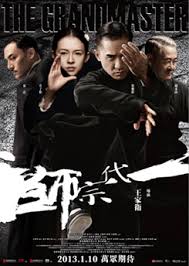
The Grandmaster (2013)
Director: Wong Kar-wai
Cast: Tony Leung Chiu-wai, Zhang Ziyi, Chang Chen, Wang Qingxiang, Song Hye-kyo
The Grandmaster (2013), directed by Wong Kar-wai, unfolds as a poetic and visually resonant #MartialArtsBiography, chronicling the life of Wing Chun master Ip Man—the famed mentor of Bruce Lee—against the backdrop of 1930s–1940s China. The film weaves themes of honor, tradition, and emotional longing through the martial artistry and political upheaval of the era. #TheGrandmaster #WongKarWai
Tony Leung Chiu-wai anchors the film with a poised, introspective portrayal of Ip Man, embodying a disciplined warrior torn between philosophy and survival. Zhang Ziyi delivers a luminous presence as Gong Er, a fellow martial artist driven by familial duty and vengeance, their dynamic both elegant and charged. Chang Chen and Wang Qingxiang enrich the ensemble with stoicism and subtle tension. #TonyLeung #ZhangZiyi
Visually, the film is sumptuous—Philippe Le Sourd’s cinematography transforms rain-soaked duels and ornate interiors into paintings in motion. Action choreography by Yuen Wo Ping becomes a kinetic dance, where each fight expresses emotional undercurrents as much as physical skill. Wong’s direction merges eras with slow pacing and lyrical framing, pushing martial arts into meditative cinema. #Cinematography #ActionChoreography
At its heart, The Grandmaster explores legacy, discipline, and the personal cost of cultural upheaval. Ip Man’s journey is shaped by fleeting connections and the fading traditions of martial arts amidst war. Critics praise its stunning form and conceptual depth—Rotten Tomatoes notes “auteur’s stylistic flourishes in gorgeous cinematography and explosive action set pieces.” Rotten Tomatoes Yet some viewers acknowledge a narrative that favors mood over clarity, reflecting Wong’s signature non-linear storytelling and emotional emphasis.
Ultimately, The Grandmaster transcends conventional kung-fu cinema, offering deeply poetic, exquisitely staged drama. It’s a film for those who value the synergy of artistry and combat, and the echoes of human spirit within cinematic movement.
Would you like comparisons with other Ip Man films or deeper scene analyses?
The Grandmaster (2013), directed by Wong Kar-wai, unfolds as a poetic and visually resonant #MartialArtsBiography, chronicling the life of Wing Chun master Ip Man—the famed mentor of Bruce Lee—against the backdrop of 1930s–1940s China. The film weaves themes of honor, tradition, and emotional longing through the martial artistry and political upheaval of the era. #TheGrandmaster #WongKarWai
Tony Leung Chiu-wai anchors the film with a poised, introspective portrayal of Ip Man, embodying a disciplined warrior torn between philosophy and survival. Zhang Ziyi delivers a luminous presence as Gong Er, a fellow martial artist driven by familial duty and vengeance, their dynamic both elegant and charged. Chang Chen and Wang Qingxiang enrich the ensemble with stoicism and subtle tension. #TonyLeung #ZhangZiyi
Visually, the film is sumptuous—Philippe Le Sourd’s cinematography transforms rain-soaked duels and ornate interiors into paintings in motion. Action choreography by Yuen Wo Ping becomes a kinetic dance, where each fight expresses emotional undercurrents as much as physical skill. Wong’s direction merges eras with slow pacing and lyrical framing, pushing martial arts into meditative cinema. #Cinematography #ActionChoreography
At its heart, The Grandmaster explores legacy, discipline, and the personal cost of cultural upheaval. Ip Man’s journey is shaped by fleeting connections and the fading traditions of martial arts amidst war. Critics praise its stunning form and conceptual depth—Rotten Tomatoes notes “auteur’s stylistic flourishes in gorgeous cinematography and explosive action set pieces.” Rotten Tomatoes Yet some viewers acknowledge a narrative that favors mood over clarity, reflecting Wong’s signature non-linear storytelling and emotional emphasis.
Ultimately, The Grandmaster transcends conventional kung-fu cinema, offering deeply poetic, exquisitely staged drama. It’s a film for those who value the synergy of artistry and combat, and the echoes of human spirit within cinematic movement.
Would you like comparisons with other Ip Man films or deeper scene analyses?